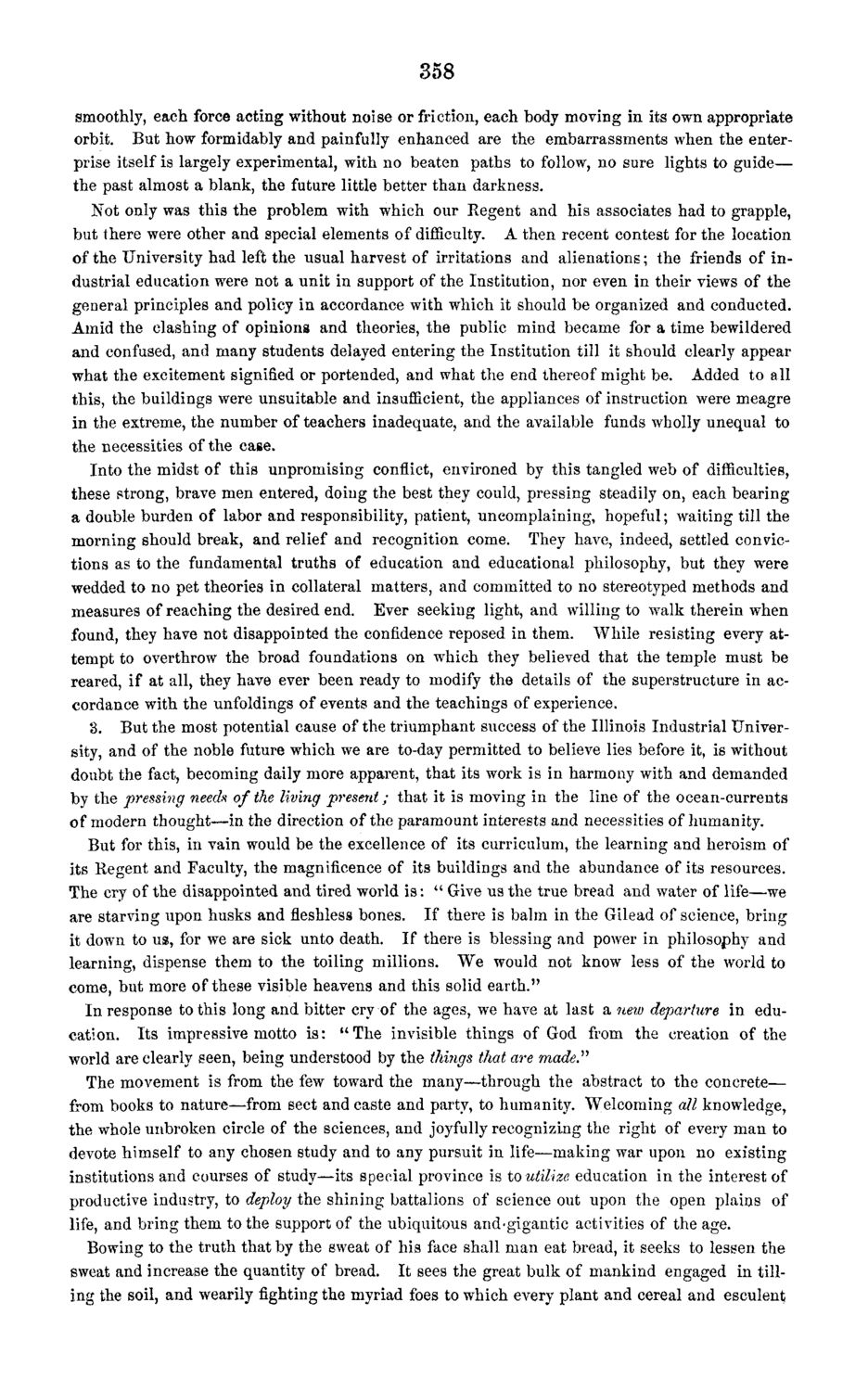| |
| |
Caption: Board of Trustees Minutes - 1871
This is a reduced-resolution page image for fast online browsing.

EXTRACTED TEXT FROM PAGE:
358 smoothly, each force acting without noise or friction, each body moving in its own appropriate orbit. But how formidably and painfully enhanced are the embarrassments when the enterprise itself is largely experimental, with no beaten paths to follow, no sure lights to guide— the past almost a blank, the future little better than darkness. Not only was this the problem with which our Regent and his associates had to grapple, but there were other and special elements of difficulty. A then recent contest for the location of the University had left the usual harvest of irritations and alienations; the friends of industrial education were not a unit in support of the Institution, nor even in their views of the general principles and policy in accordance with which it should be organized and conducted. Amid the clashing of opinions and theories, the public mind became for a time bewildered and confused, and many students delayed entering the Institution till it should clearly appear what the excitement signified or portended, and what the end thereof might be. Added to all this, the buildings were unsuitable and insufficient, the appliances of instruction were meagre in the extreme, the number of teachers inadequate, and the available funds wholly unequal to the necessities of the case. Into the midst of this unpromising conflict, environed by this tangled web of difficulties, these strong, brave men entered, doing the best they could, pressing steadily on, each bearing a double burden of labor and responsibility, patient, uncomplaining, hopeful; waiting till the morning should break, and relief and recognition come. They have, indeed, settled convictions as to the fundamental truths of education and educational philosophy, but they were wedded to no pet theories in collateral matters, and committed to no stereotyped methods and measures of reaching the desired end. Ever seeking light, and willing to walk therein when found, they have not disappointed the confidence reposed in them. While resisting every attempt to overthrow the broad foundations on which they believed that the temple must be reared, if at all, they have ever been ready to modify the details of the superstructure in accordance with the unfoldings of events and the teachings of experience. 3. But the most potential cause of the triumphant success of the Illinois Industrial University, and of the noble future which we are to-day permitted to believe lies before it, is without doubt the fact, becoming daily more apparent, that its work is in harmony with and demanded by the pressing needs of the living present; that it is moving in the line of the ocean-currents of modern thought—in the direction of the paramount interests and necessities of humanity. But for this, in vain would be the excellence of its curriculum, the learning and heroism of its Regent and Faculty, the magnificence of its buildings and the abundance of its resources. The cry of the disappointed and tired world is: " Give us the true bread and water of life—we are starving upon husks and fleshless bones. If there is balm in the Gilead of science, bring it down to us, for we are sick unto death. If there is blessing and power in philosophy and learning, dispense them to the toiling millions. We would not know less of the world to come, but more of these visible heavens and this solid earth." In response to this long and bitter cry of the ages, we have at last a new departure in education. Its impressive motto is: "The invisible things of God from the creation of the world are clearly seen, being understood by the things that are made" The movement is from the few toward the many—through the abstract to the concrete— from books to nature—from sect and caste and party, to humanity. Welcoming all knowledge, the whole unbroken circle of the sciences, and joyfully recognizing the right of every man to devote himself to any chosen study and to any pursuit in life—making war upon no existing institutions and courses of study—its special province is to utilize education in the interest of productive industry, to deploy the shining battalions of science out upon the open plains of life, and bring them to the support of the ubiquitous and'gigantic activities of the age. Bowing to the truth that by the sweat of his face shall man eat bread, it seeks to lessen the sweat and increase the quantity of bread. It sees the great bulk of mankind engaged in tilling the soil, and wearily fighting the myriad foes to which every plant and cereal and esculent
| |